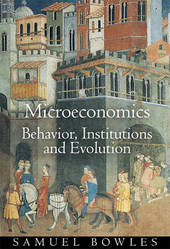
|
Microeconomics: Behavior, Institutions, and Evolution
Paperback / softback
Main Details
| Title |
Microeconomics: Behavior, Institutions, and Evolution
|
| Authors and Contributors |
By (author) Samuel Bowles
|
| Series | The Roundtable Series in Behavioral Economics |
|---|
| Physical Properties |
| Format:Paperback / softback | | Pages:608 | | Dimensions(mm): Height 235,Width 152 |
|
| Category/Genre | Microeconomics |
|---|
| ISBN/Barcode |
9780691126388
|
| Classifications | Dewey:338.5 |
|---|
| Audience | | Professional & Vocational | | Tertiary Education (US: College) | |
|---|
| Illustrations |
69 line illus. 40 tables.
|
|
Publishing Details |
| Publisher |
Princeton University Press
|
| Imprint |
Princeton University Press
|
| Publication Date |
5 February 2006 |
| Publication Country |
United States
|
Description
In this novel introduction to modern microeconomic theory, Samuel Bowles returns to the classical economists' interest in the wealth and poverty of nations and people, the workings of the institutions of capitalist economies, and the coevolution of individual preferences and the structures of markets, firms, and other institutions. Using recent advances in evolutionary game theory, contract theory, behavioral experiments, and the modeling of dynamic processes, he develops a theory of how economic institutions shape individual behavior, and how institutions evolve due to individual actions, technological change, and chance events. Topics addressed include institutional innovation, social preferences, nonmarket social interactions, social capital, equilibrium unemployment, credit constraints, economic power, generalized increasing returns, disequilibrium outcomes, and path dependency. Each chapter is introduced by empirical puzzles or historical episodes illuminated by the modeling that follows, and the book closes with sets of problems to be solved by readers seeking to improve their mathematical modeling skills.Complementing standard mathematical analysis are agent-based computer simulations of complex evolving systems that are available online so that readers can experiment with the models. Bowles concludes with the time-honored challenge of "getting the rules right," providing an evaluation of markets, states, and communities as contrasting and yet sometimes synergistic structures of governance. Must reading for students and scholars not only in economics but across the behavioral sciences, this engagingly written and compelling exposition of the new microeconomics moves the field beyond the conventional models of prices and markets toward a more accurate and policy-relevant portrayal of human social behavior.
Author Biography
Samuel Bowles is Research Professor and Director of the Behavioral Sciences Program at the Santa Fe Institute and Professor of Economics at the University of Siena. He is coauthor of "Notes and Problems in Microeconomic Theory" (North Holland Texts in Mathematical Economics) and "Schooling in Capitalist America" (Basic Books), and has published articles, most recently, in the "American Economic Review, Nature", the "Quarterly Journal of Economics", the "Economic Journal", and the "Journal of Theoretical Biology".
Reviews"There must be dozens of introductory books with the word 'microeconomics' in the title, but for ambition alone Samuel Bowles's volume stands out. Not only does Bowles convey the elements of the conventional theory of capitalist economics--he offers a wealth of cutting-edge material as well ... [His] theory is neat, thought-provoking, and highly original--as is much else in this most unusual take on microeconomics."--Eric Maskin, Science "This important and highly impressive volume is intended as an overview of cutting-edge developments in microeconomics for graduate students... The work is well written and carefully structured... [T]his is a very fertile and inspiring book, of much broader use than its intended audience... Its analytical accounts of institutional structures and its masterly fusion of institutional and evolutionary themes might eventually warrant its status as a modern classic."--Geoffrey M. Hodgson, Economics and Philosophy
|